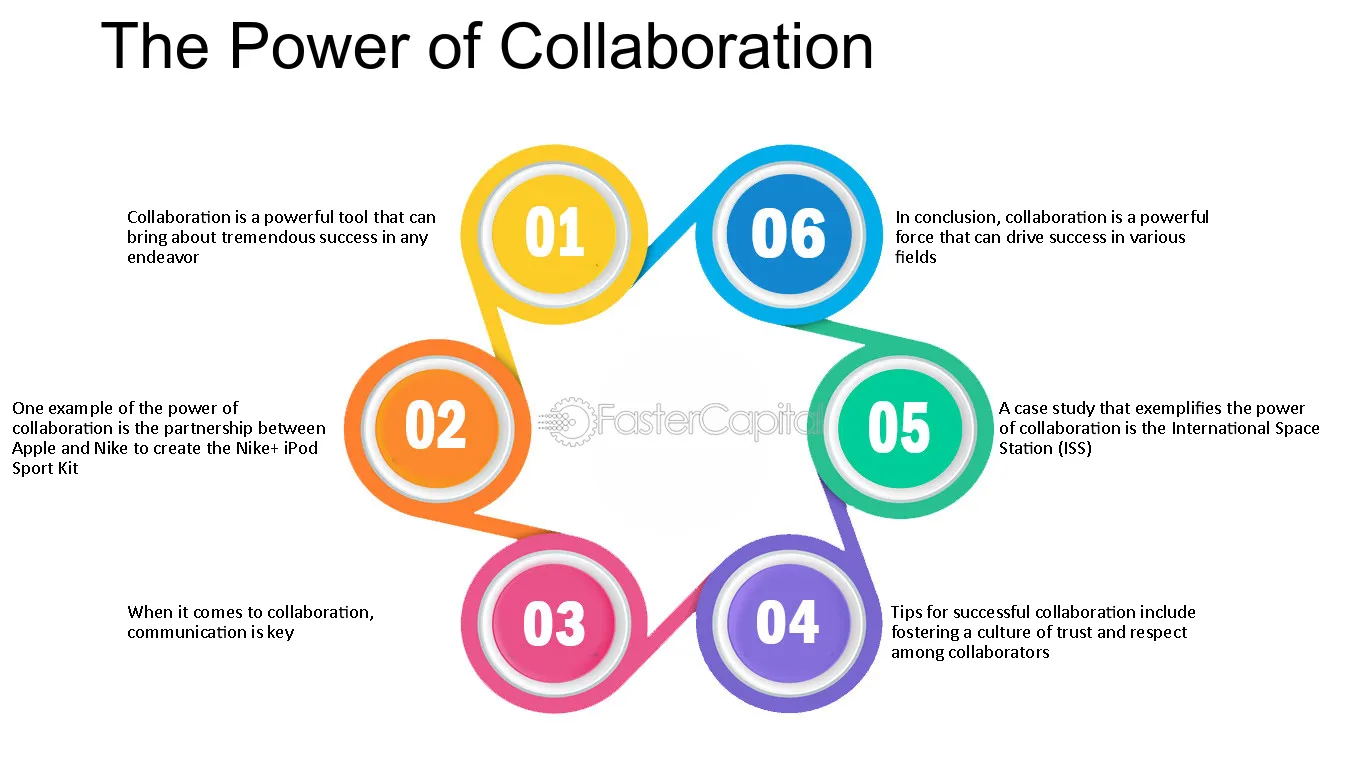
Collaboration is the process of working together to achieve a common goal. It involves sharing ideas, resources, and effort, and it can be a powerful tool for innovation, problem-solving, and team building.
Collaboration can take many different forms, from informal brainstorming sessions to formal project teams. It can be used to develop new products, services, or processes, or to solve complex problems. Collaboration can also be used to build relationships, trust, and understanding between individuals and teams.
There are many benefits to collaboration, including:
- Increased creativity and innovation
- Improved problem-solving
- Enhanced team building
- Greater efficiency and productivity
- Improved communication and understanding
Collaboration is an essential skill for anyone who wants to be successful in today’s workplace. It is a key ingredient for innovation, problem-solving, and team building. If you want to achieve great things, it is important to learn how to collaborate effectively.
1. Communication
Communication is essential for collaboration. Without effective communication, team members cannot share ideas, coordinate their efforts, or resolve conflicts. There are many different aspects to effective communication, including verbal communication, nonverbal communication, and active listening.
- Verbal communication is the use of words to share information. It is important to be clear and concise when communicating verbally, and to use language that is appropriate for the audience.
- Nonverbal communication is the use of body language, facial expressions, and eye contact to communicate. Nonverbal communication can be just as important as verbal communication, and it can be used to convey emotions, attitudes, and intentions.
- Active listening is the process of listening attentively to what others have to say. It involves paying attention to both the verbal and nonverbal messages that are being communicated, and asking clarifying questions to ensure understanding.
When team members are able to communicate effectively, they are able to collaborate more effectively. They can share ideas more easily, coordinate their efforts more efficiently, and resolve conflicts more quickly. Effective communication is essential for successful collaboration.
2. Cooperation
Cooperation is essential for collaboration. Without cooperation, team members would not be able to work together effectively to achieve their goals. There are many different aspects to cooperation, including:
- Shared goals: Team members must have a shared understanding of their goals in order to cooperate effectively. When team members are working towards different goals, it can be difficult to coordinate their efforts and achieve success.
- Communication: Team members must be able to communicate effectively with each other in order to cooperate. This includes being able to share ideas, listen to others, and resolve conflicts.
- Trust: Team members must trust each other in order to cooperate effectively. When team members trust each other, they are more willing to share ideas, take risks, and support each other.
- Respect: Team members must respect each other in order to cooperate effectively. This includes respecting each other’s opinions, ideas, and backgrounds.
When team members are able to cooperate effectively, they are able to achieve great things. They can pool their knowledge and skills, work together to overcome challenges, and achieve their goals more quickly and efficiently.
3. Coordination
Coordination is essential for collaboration. Without coordination, team members would be working at cross-purposes, and it would be difficult to achieve any meaningful results. There are many different aspects to coordination, including:
- Planning: Team members must plan their work together in order to ensure that everyone is on the same page and working towards the same goals.
- Communication: Team members must communicate effectively with each other in order to coordinate their efforts. This includes being able to share ideas, listen to others, and resolve conflicts.
- Scheduling: Team members must schedule their work together in order to avoid conflicts and ensure that everyone is working on the right tasks at the right time.
- Tracking: Team members must track their progress and communicate it to each other in order to ensure that everyone is on track and that any problems are identified and resolved early on.
When team members are able to coordinate their efforts effectively, they are able to achieve great things. They can work together to overcome challenges, achieve their goals more quickly and efficiently, and produce high-quality work.
Here are some real-life examples of how coordination can help collaboration work:
- A team of software engineers is working on a new product. They use a project management tool to track their progress, share ideas, and coordinate their work. This helps them to avoid conflicts and ensure that everyone is working on the right tasks at the right time.
- A team of marketing professionals is working on a new campaign. They use a shared calendar to schedule their meetings, track their progress, and communicate with each other. This helps them to stay organized and ensure that everyone is working towards the same goals.
- A team of customer service representatives is working together to provide support to customers. They use a shared knowledge base to answer questions, track customer interactions, and coordinate their work. This helps them to provide consistent and high-quality support to customers.
These are just a few examples of how coordination can help collaboration work. When team members are able to coordinate their efforts effectively, they are able to achieve great things.
4. Trust
Trust is a fundamental component of collaboration. Without trust, team members would be hesitant to share their ideas, take risks, or support each other. This would make it difficult to achieve any meaningful results.
There are many different aspects to trust, including:
- Honesty: Team members must be honest with each other in order to build trust. This means being truthful about their intentions, their abilities, and their progress.
- Reliability: Team members must be reliable in order to build trust. This means being able to count on them to do what they say they will do, and to meet their commitments.
- Competence: Team members must be competent in order to build trust. This means having the skills and knowledge necessary to do their jobs well.
- Confidentiality: Team members must be able to keep confidential information confidential. This means not sharing it with anyone who does not need to know it.
When team members trust each other, they are more likely to collaborate effectively. They are more willing to share their ideas, take risks, and support each other. This leads to better decision-making, more innovation, and greater productivity.
Here are some real-life examples of how trust can help collaboration work:
- A team of scientists is working on a new medical treatment. They trust each other to share their ideas, take risks, and support each other. This helps them to develop a new treatment that is more effective than anything that has come before.
- A team of engineers is working on a new product. They trust each other to do their jobs well and to meet their commitments. This helps them to develop a new product that is high-quality and meets the needs of customers.
- A team of customer service representatives is working together to provide support to customers. They trust each other to provide consistent and high-quality support. This helps them to build strong relationships with customers and to resolve their issues quickly and efficiently.
These are just a few examples of how trust can help collaboration work. When team members trust each other, they are able to achieve great things.
5. Respect
Respect is a fundamental component of collaboration. Without respect, team members would not be able to work together effectively to achieve their goals. Respect involves valuing the opinions and ideas of others, even if you do not agree with them. It also involves being open to new ideas and perspectives, and being willing to change your mind.
- Value diversity: Collaboration is most effective when team members come from diverse backgrounds and have different perspectives. When team members value diversity, they are more likely to be open to new ideas and to consider different approaches. This can lead to more innovative and creative solutions.
- Be open-minded: Collaboration requires team members to be open-minded and willing to consider new ideas, even if they are different from their own. When team members are open-minded, they are more likely to be receptive to new information and to learn from others. This can lead to better decision-making and improved problem-solving.
- Be willing to change your mind: Collaboration often requires team members to change their minds and adapt to new information. When team members are willing to change their minds, they are more likely to be flexible and to find the best solutions to problems. This can lead to more effective and successful collaboration.
- Avoid interrupting: When team members are collaborating, it is important to avoid interrupting each other. Interrupting can be disrespectful and it can make it difficult for others to share their ideas. When team members avoid interrupting each other, they are more likely to have productive and effective conversations.
Respect is essential for collaboration to work effectively. When team members respect each other, they are more likely to be open to new ideas, to consider different perspectives, and to work together to achieve their goals.
FAQs on Collaboration Works
Collaboration is an essential skill for anyone who wants to be successful in today’s workplace. It is a key ingredient for innovation, problem-solving, and team building. However, there are still some common misconceptions about collaboration that can prevent people from realizing its full benefits.
Question 1: Is collaboration always easy?
Answer: No, collaboration is not always easy. It can be challenging to work with others, especially if you have different personalities or work styles. However, the benefits of collaboration far outweigh the challenges.
Question 2: Is collaboration only necessary for large projects?
Answer: No, collaboration is not only necessary for large projects. It can be beneficial for any task, regardless of size or complexity.
Question 3: Does collaboration always require face-to-face interaction?
Answer: No, collaboration does not always require face-to-face interaction. In today’s digital age, there are many tools that allow people to collaborate remotely.
Question 4: Is it okay to disagree with others during collaboration?
Answer: Yes, it is okay to disagree with others during collaboration. In fact, it is important to be able to express your opinions and ideas, even if they are different from others.
Question 5: How can I improve my collaboration skills?
Answer: There are many ways to improve your collaboration skills. Some helpful tips include being open-minded, being a good listener, and being willing to compromise.
Question 6: What are the benefits of collaboration?
Answer: There are many benefits to collaboration, including increased creativity, improved problem-solving, enhanced team building, greater efficiency and productivity, and improved communication and understanding.
Summary of key takeaways or final thought:
Collaboration is an essential skill for anyone who wants to be successful in today’s workplace. It is not always easy, but the benefits far outweigh the challenges. By following these tips, you can improve your collaboration skills and reap the benefits of working with others.
Collaboration Works Tips
Collaboration is essential for success in today’s workplace. It allows teams to achieve more than they could individually, and it can lead to innovation, problem-solving, and improved communication. Here are five tips for effective collaboration:
Tip 1: Set clear goals and objectives.
Before you start collaborating, it is important to set clear goals and objectives. This will help to ensure that everyone is working towards the same thing and that the collaboration is successful.
Tip 2: Communicate effectively.
Communication is key to successful collaboration. Make sure that you are communicating effectively with your team members, both verbally and nonverbally. Be clear and concise in your communication, and be sure to listen to what others have to say.
Tip 3: Be respectful.
Respect is essential for collaboration. Be respectful of your team members’ opinions and ideas, even if you don’t agree with them. Be open to new ideas and perspectives, and be willing to compromise.
Tip 4: Be flexible.
Things don’t always go according to plan, so it is important to be flexible when collaborating. Be willing to adapt to change and to find new solutions to problems.
Tip 5: Celebrate success.
When you achieve a goal through collaboration, it is important to celebrate your success. This will help to build team morale and to encourage future collaboration.
Summary of key takeaways or benefits:
By following these tips, you can improve your collaboration skills and reap the benefits of working with others. Collaboration can lead to increased creativity, improved problem-solving, enhanced team building, greater efficiency and productivity, and improved communication and understanding.
Transition to the article’s conclusion:
Collaboration is an essential skill for anyone who wants to be successful in today’s workplace. By following these tips, you can improve your collaboration skills and work effectively with others to achieve your goals.
Conclusion
Collaboration is essential for success in today’s workplace. It allows teams to achieve more than they could individually, and it can lead to innovation, problem-solving, and improved communication. By following the tips in this article, you can improve your collaboration skills and work effectively with others to achieve your goals.
Collaboration is not always easy, but it is worth the effort. When teams collaborate effectively, they can achieve great things. They can develop new products and services, solve complex problems, and build strong relationships. Collaboration is the key to success in today’s global economy.



